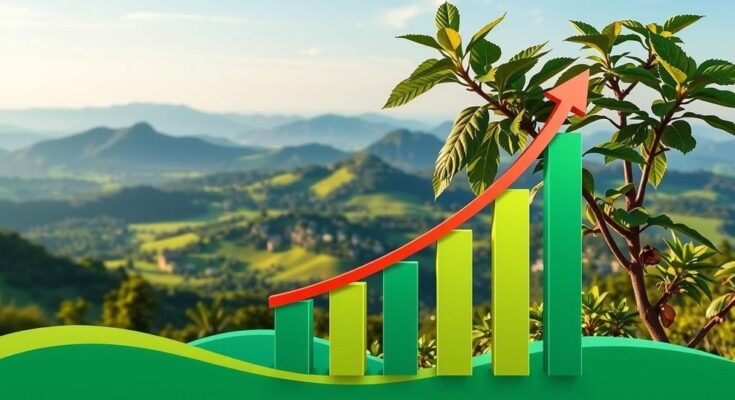Ghana’s economy is projected to grow by 5.4% in 2025, led by a strong mining sector focusing on gold production. Despite a remarkable recovery in 2024, other sectors face ongoing challenges. Structural weaknesses must be addressed for sustainable growth.
Ghana’s economy is on a promising trajectory, with projections indicating a robust Gross Domestic Product (GDP) growth of 5.4% in 2025. This outlook is articulated by Jibran Qureishi, Head of Africa Research at Standard Bank Group, during the Stanbic Economic Series webinar, titled “The Economy under a New Era.” The mining sector, particularly gold production, is identified as a primary driver of this economic resurgence, though challenges persist in non-mining sectors such as manufacturing and real estate.
According to Mr. Qureishi, the economic performance of Ghana experienced a substantial recovery in 2024, achieving a GDP growth of 5.8% year-on-year, a significant increase from the 2.9% recorded in 2023. He noted, “This is the fastest rate of economic growth since 2021, and we anticipate this momentum will continue, with projected growth of 5.4% in 2025 and 5.7% in 2026.”
The mining sector’s contribution cannot be overstated, as Mr. Qureishi emphasized its critical role in Ghana’s economic revival, particularly through gold production. He remarked, “There has been a notable pickup in mining activities across the country, with gold leading the charge.” Furthermore, he mentioned the recovery of underperforming mines, like Obuasi, and the expected establishment of a significant lithium facility targeting 2026/2027, which could enhance future economic conditions.
Despite these positive mining developments, other sectors are encountering significant hurdles. Observing this, Mr. Qureishi stated, “While mining is flourishing, sectors such as manufacturing and real estate continue to face persistent headwinds.” Agricultural productivity has also suffered due to adverse climatic conditions last year, with dry spells impacting Northern Ghana’s growth.
While the outlook remains optimistic, Mr. Qureishi cautioned about existing structural weaknesses that must be addressed for sustainable growth. He concluded, “The revival of key mining operations and the potential for stronger-than-expected growth in 2026 highlight the resilience of Ghana’s economy, but issues such as energy sector arrears and fiscal imbalances must be tackled for growth to remain stable.”
In summary, Ghana’s GDP is forecasted to increase by 5.4% in 2025, driven primarily by the mining sector, particularly gold production. Although the economy demonstrated a strong recovery in 2024, challenges in non-mining sectors like manufacturing and real estate remain prevalent. Addressing existing structural weaknesses will be crucial to maintaining this growth momentum moving forward.
Original Source: africa.businessinsider.com




